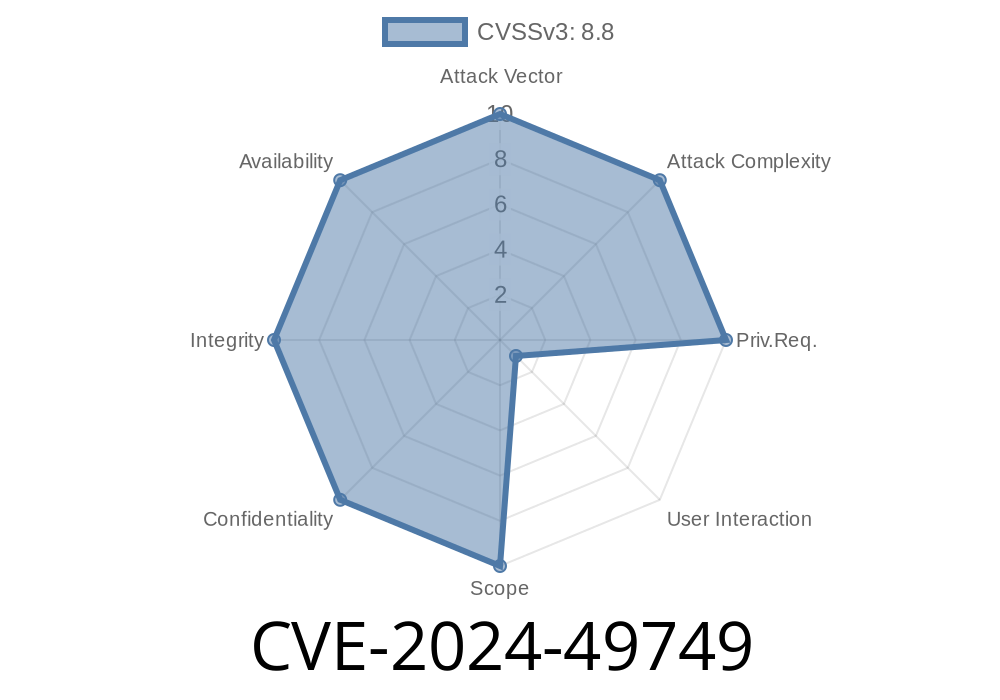GIF images are one of the simplest yet most widely used image formats on the internet, from memes to website animations. Under the hood, parsing a GIF isn't trivial. Just one small bug in how those files are handled can be catastrophic – like with CVE-2024-49749.
This vulnerability affects GIFLIB, an open-source library used by countless Linux distributions and desktop applications for reading GIF files. Let’s break down how this bug works, see some code, and understand just how dangerous it can be.
What is CVE-2024-49749?
CVE-2024-49749 is an Integer Overflow vulnerability inside the DGifSlurp function in the file dgif_lib.c. This function is responsible for reading the entire contents of a GIF file into memory. If a malicious attacker provides a specially-crafted GIF, the code can accidentally calculate the wrong buffer size, leading to a buffer overflow (writing more data than the buffer can handle). This can allow an attacker to execute code remotely, often leading to things like system compromise, data theft, or the spread of malware.
Root Cause Analysis
When a GIF file is loaded, applications trust DGifSlurp to parse multiple frames, store image data, and handle memory allocation safely.
Typical Flow in DGifSlurp
Within DGifSlurp, the code tries to calculate the amount of memory needed for a new image or data block like this (simplified):
// Example: allocating space for image pixels
GifPixelType *RasterBits =
(GifPixelType *) malloc (ImageDesc->Width * ImageDesc->Height * sizeof(GifPixelType));
If ImageDesc->Width and ImageDesc->Height in the GIF file are both huge numbers, multiplying them can "wrap around" (overflow), causing malloc to actually allocate a tiny buffer (or fail), while future code writes gigabytes of data—way past the buffer limit.
Here is a hypothetical, representative snippet based on CVE-2024-49749 advisories
size_t width = ImageDesc->Width; // Controlled by the attacker
size_t height = ImageDesc->Height; // Also controlled
// Potential for overflow here:
size_t RasterSize = width * height;
GifPixelType *RasterBits = (GifPixelType *)malloc(RasterSize * sizeof(GifPixelType));
if (RasterBits == NULL) {
// Handle error
}
If width * height exceeds the maximum value a size_t can store, it wraps around, and malloc allocates a buffer much smaller than the code expects.
A maliciously crafted GIF file can set huge frame width and height values in the header, and then supply more image data than the real buffer size, causing a heap buffer overflow.
Why is this bad?
- No User Interaction Needed: This happens automatically when an application just opens or processes a GIF.
- No Additional Privileges Needed: The attack runs with the privileges of the user or process running the vulnerable GIFLIB. Desktop thumbnailers, image viewers, or web servers are all at risk.
- Remote Code Execution: Attackers can inject code directly into the application’s memory and run it, leading to full system compromise.
Sample Exploit Workflow
1. Craft a Malicious GIF: Set massive values for width and height in the GIF header (e.g., xFFFFFFFF), tricking the parser’s multiplication.
2. Overflow Buffer: Overflow the small (but logically "large") buffer with shellcode or data that, when executed, grants access or control to the attacker.
3. Trigger Processing: Send the file to a web service, upload it to a server, or email it to a victim whose system auto-generates thumbnails.
Has This Been Fixed?
Yes! The bug is fixed in GIFLIB 5.2.2. The fix involves checking for overflows before allocating buffers:
// Before allocating memory, check
if (width == || height == || width > MAX_SIZE / height) {
// Error: request too large, possible overflow
}
size_t RasterSize = width * height;
// Safe allocation
GifPixelType *RasterBits = malloc(RasterSize * sizeof(GifPixelType));
Always validate values before calculation to avoid integer overflow.
Who is at risk?
- Linux/Unix users with unpatched GIFLIB (default on many systems)
- Any desktop/image application using GIFLIB (GIMP, ImageMagick, GNOME/KDE file explorers)
Audit any code that handles GIF files directly for similar patterns
- Use open-source tools like AddressSanitizer to catch buffer overflows in development
References
- CVE-2024-49749 Mitre Record
- GIFLIB GitHub: Security Fixes
- Red Hat Security Advisory RHSA-2024-XXX
- Openwall CVE Page
Conclusion
A single unchecked multiplication in an image parser can open up a gaping security hole across global infrastructure. CVE-2024-49749 in GIFLIB reminds us: never trust input, especially file metadata. Always check allocations, keep libraries up to date, and consider what even a simple GIF file can do in the wrong hands.
Timeline
Published on: 01/21/2025 23:15:15 UTC
Last modified on: 01/22/2025 15:15:14 UTC
